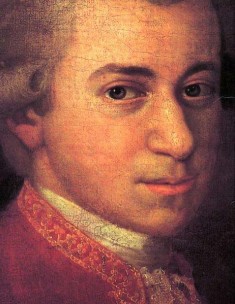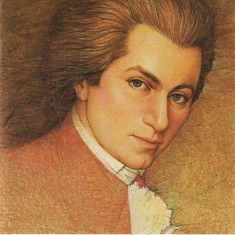| Wolfgang Amadeus Mozart | |
|---|---|
 |
|
| Composer | |
| Specialty | Keyboard, violin |
| Born | Jan. 27, 1756 |
| Died | Dec. 5, 1791 |
| Nationality | Austrian |
Wolfgang Amadeus Mozart was an Austrian composer. He was a remarkable child prodigy, learning to play the violin and clavichord at the age of three or four and beginning to write his own compositions by the time he was five. Although he had a steady job at the court in Salzburg, he left it to travel across Europe and was eventually dismissed.
He lived his later life in Vienna, where he wrote many of his most famous works. In all, Mozart wrote more than 600 pieces and has remained popular ever since.
Early Years
Mozart was born on January 27, 1756, in Salzburg, then part of the Holy Roman Empire. His father, Leopold, was himself a composer of note. By the time he was three years old, Wolfgang was able to play minuets from memory, while at the age of six he was considered a superb player of the harpsichord.
He was not given a great deal of formal education, instead accompanying his father and sister, herself an excellent musician, around Europe in order to show off his abilities. He picked up at least the rudiments of more than a dozen languages during his travels and demonstrated his ability to play a tune perfectly from memory after having heard it only once.
By the time Mozart was ten, he was able to listen to a treble-clef melody and produce a perfect equivalent in basso continuo. He did not need to use any instrument; he did it all in his head. His first symphony had already been written by this time, probably transcribed for him by Leopold. His first publications appeared in 1764.
Mozart wrote an oratorio at the age of 11, and the following year produced his debut opera. By the early 1790s, he had been given a place in the orchestra of the court of Salzburg’s ruler. This man stated that he was doing it out of kindness and did not actually like Mozart’s music.
Beginnings of a Career
While he was at the court, Mozart wrote a large number of psalms while also giving lessons in the violin and keyboard. He was not particularly happy in this role, which he felt was that of a servant. His early recognition meant that he fully expected to be at the center of attention wherever he went.
As a result, in 1777, he requested permission to travel to give performances outside Salzburg. This was eventually forthcoming, and Mozart went to Mannheim where he met Aloysia Weber, a soprano with whom he fell in love. However, she later married someone else. After his return to Salzbug, Mozart’s mother died, and his father advised him to remain in his home city. He was short on funds, and repeatedly asked for permission to leave once more. This time the ruler denied it, eventually becoming so annoyed with Mozart’s rudeness that he dismissed him outright.
Mozart Finds Success
 Finally free of his court obligations, Mozart settled in Vienna, where he became extremely successful. His income came mostly from playing the piano and composing, and his personal life recovered, too. In 1782, he married Constanze, the sister of Aloysia Weber.
Finally free of his court obligations, Mozart settled in Vienna, where he became extremely successful. His income came mostly from playing the piano and composing, and his personal life recovered, too. In 1782, he married Constanze, the sister of Aloysia Weber.
During this period, Mozart produced many of his best known operas, including Cosi fan tutte and The Marriage of Figaro. He also made the acquaintance of Haydn, who was living in the same city, and the two men would frequently hold meetings at which they would discuss symphonies and string quartets in particular. Eventually, Haydn and Mozart became close friends.
Later Years
Mozart continued to write music at a great rate, but toward the end of his life he began to drink heavily. The amount he spent on alcohol was so large that he fell into severe debt, which forced him to write even harder in order to make ends meet. In August of 1791, he was visited by an unidentified man who asked him to write a requiem mass, but to keep the job secret.
In recent years it has been established that this was a Count who commissioned pieces in order to copy them and pretend they were his own works. Mozart, however, became scared that the death the mass was to commemorate would be his own. His deepening superstition and fear led him to put off work on the requiem piece.
Death and Controversy
Meanwhile, Mozart’s health was declining, probably thanks to the rheumatic fever he had long suffered from. By November, his situation had worsened, and it became clear to him that he was dying. In his last days, he insisted that he had been poisoned, which later gave rise to the unfounded allegation that his rival, Salieri, had murdered him.
In fact, it is more likely that he died because of his heavy drinking and mercury poisoning; the liquid metal was frequently used in medicine at the time. Although Mozart’s funeral was relatively simple, owing to his lack of funds, the popular story that he was buried alone and forgotten is untrue. In fact, other composers – including Salieri – were there, and several memorial concerts were held in his honor.